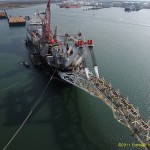 Offshore drilling rig jobs are hot right now. In the last decade, oil companies cut back too much on their staff and equipment, and now that oil prices have exceeded $100 per barrel, they are scrambling to put up new oil rigs and staff them. Based on the analysis of top economists and investment fund managers, this sector is likely to see a lot of activity for the next 15 to 20 years. This is good news for job seekers in the oil sector.
Offshore drilling rig jobs are hot right now. In the last decade, oil companies cut back too much on their staff and equipment, and now that oil prices have exceeded $100 per barrel, they are scrambling to put up new oil rigs and staff them. Based on the analysis of top economists and investment fund managers, this sector is likely to see a lot of activity for the next 15 to 20 years. This is good news for job seekers in the oil sector.
The question now is “How do you get an offshore drilling rig job?”. The process can basically be broken down into 9 steps.
1. Find an oil company. The two most obvious ways are through online job boards like Monster.com and newspaper job advertisements posted by oil company human resource departments. The problem with online job boards is that they usually target mainstream junior and mid-level executive jobs in mainstream industries. When you are trying to break into the oil industry, online job boards are not your best bet. As for newspaper job advertisements, only the big companies like Shell would post to national newspapers. Smaller oil companies (which subcontract their services to the major players) normally restrict their advertisements to local or regional newspapers.
The best way is to find recruitment agencies which specialize in the oil industry. If you do not like going through middle-men, one way is to look through the Wilshire Stock Index. This lists the 5000 biggest companies in the US. You should be able to find a number of large and reputable oil companies in this list. Another way is to look for oil companies and drilling companies on the internet using the three major search engines: Google, Yahoo and MSN. One advantage of this method is that you can find international companies as well as US-based companies. The disadvantage is that many smaller oil companies do not have web-sites or email.
2. Find the contact address. After you have a decent-sized list of companies, you will need to find their contact address. If possible, you should get both the email address and postal address of the HR department as well as the phone number. Try to also get the HR manager’s name and office address. When you submit your job application, you will want to send it to the HR manager rather than the HR department. It is also better to send your job application both by email and by post. Frankly, neither delivery method on its own is reliable. If you dare, give them a week or so to receive and process your application, then call up to confirm that they have received it.
3. Find out what the company wants. Remember: no one is going to hire you because you want a job. You will only be hired if you can show the oil company what is in it for them. The easiest way is to look at their past and current job postings. If you know the company is in the industry but did not post anything (possibly because they go through a recruitment agency), you can borrow the job postings of other companies to find out what is normally wanted.
4. Write your cover letter and resume and submit them. In your cover letter, make it clear what job you are applying for. Make sure you briefly relate your most relevant experience to what the oil company wants. In your resume/CV, you do not need to list every job and academic achievement in your life. Just list the most relevant to the job you are applying. Give some details which highlight why you are a good fit for what they want. Do remember to include your contact details.
5. Repeat steps #1 to #4 until you receive an interview. Do not expect your first 10 applications to succeed. Depending on the post you are applying for, maybe even your first 100 applications will fail. Be persistent.
6. Preparing for the interview. Congratulations. You have passed the first major hurdle. Now you need to prepare for your interview. Your mouth is your most important asset here. Open your mouth and ask. Find out the dress code. Do they expect you to show up in long sleeve shirt and tie? Or will smart casual do? Do you need to bring along anything? Do they expect you to prepare anything ahead of time? If you were informed of the interview by email or by post, you will need to phone up the HR department to find out this information. Even if you could not get the phone number of the HR department, you should be able to get the main line. Phone up and get your call routed to the HR department. You want to make a good first impression, and you will not be able to do that if you are not prepared. Do not be too stressed out, though. Unless the oil company is truly desperate, do not expect your first interview to land you a job. Relax and treat your first few interviews as practice.
7. During the interview. Do not just answer the questions of your interviewers. And do not just give one word answers. Even if the question seems like it only needs a straightforward “Yes” or “No” answer, try to explain or give relevant examples. If your do not understand a question, clarify it with your interviewers. Also make sure your interviewers understand your answers. Do not let a simple misunderstanding or mis-communication cost you a job. Please note that a job interview is not just for the employer to ask you questions. You should ask your own questions. Find out who you will be working for. Hopefully, he is one of your interviewers. What is his working style? What does he really want from you? What he actually wants and what HR actually posted on the job boards or newspapers are not necessarily the same thing. Open your mouth and ask relevant questions. How does their company actually work? What are working conditions like. What is the work environment and who are your colleagues. What kind of people will you be working with? Use these as a starting point to think of your own questions. Even though you should have answers to some of these questions from your own investigations (read Part #1), you should confirm the information you already have.
8. After the interview. Case closed, right? No. This is a common mistake made by many job seekers. After your interview, take a step back and evaluate your performance. Learn from your mistakes so that you do better in your next interview. And think about whether you want to work for that oil company if they offer you a job. Remember that an interview is a 2-way street. The interviewer evaluates if they want you, and you must also evaluate if you want to work for them.
9. Repeat steps #1 to #8 until you have a good job offer. Rinse and repeat. Be persistent, do not let setbacks stop you, and eventually you will get hired.
Follow these 9 steps and you will be hired for an offshore drilling rig job. Do not be impatient. Like anything worth doing, it is worth taking time to do it properly.








